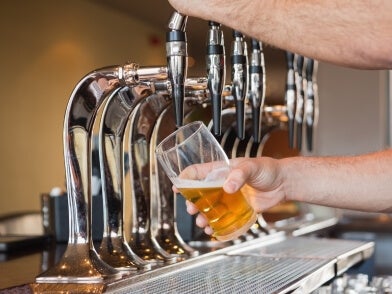This was the year that wasn't
Neil Morgan, Managing Director - Pubs & Restaurants looks back at the 2016 pub market.
Business. Built around You.
Your expert business property advisers

We all had such high hopes for 2016, but the reality is that it all turned out to be a bit of a damp squib.
Independent pub deals are still happening, and we see the occasional acquisition and expansion by one of the smaller multi site operators, but the big deals just haven’t been taking place. We’ve seen a drop in the number of pubs coming to the market across the year, and while some areas of the UK retain a sense of being bulletproof about them, on the whole it’s been a quiet 12 months, with transaction volumes down. This could shortly be set to reverse, as the demand for quality managed houses is currently outstripping supply, which in turn is driving prices up for those assets that do transact, making it an attractive time to sell.
It’s fair to say that the market has been muted for a number of reasons – obviously, we have to mention Brexit, but the introduction of the Pubs Code (and the Market Rent Only legislation contained within it) and changes to the Insurance Act have undoubtedly had an impact on the sector, and cost pressures including the introduction of the National Living Wage have also played a major part.
On Brexit, we saw the Pound hit 31-year lows immediately after the unexpected result of the referendum was announced, which has proved to be a double edged sword for operators. The rising cost of imported wet products has begun to hit margins, although the increase in inbound tourism and growing popularity of staycations has provided a boost for those pubs with letting rooms. We expect an air of uncertainty to continue into early 2017, through the end of Q1 when Article 50 is expected to be invoked, and potentially beyond.
Overall trading performance has been mixed, and publicans have, on the whole, found it to be a tough year.
The ALMR Christie & Co Benchmarking Report 2016, released in September, confirmed what we were hearing and showed that the average costs associated with running a pub are at a seven-year high, with payroll costs accounting for almost 30% of turnover.
With the Government looking to introduce an Apprenticeship Levy and increases to the rates of National Living and Minimum Wages further, some pubs and bars are having no choice but to absorb at least some of these additional payroll costs. Businesses need confidence and certainty in order to plan and invest, but uncertainty over the UK’s exit from the European Union could undermine confidence in the sector and threaten investment, particularly if restrictions over foreign labour are introduced.
Of course, 2016 was the year when the Government also gave something back to the pub industry. In April of next year, we’ll see a redistribution of business rates, which, as well as cutting the burden for most operators outside of London and the South East, will mean that many smaller pub businesses will no longer have the added pressure that these caused. The threshold has more than doubled for those eligible to pay from £6,000 to £15,000 and for many smaller independent bar and pub operators this may help to offset the rise in operating costs faced by the publican.
However, the news is not all positive, as those operators due the largest falls (including those in the North) will have to wait several years to see the full impact due to a proposed 4.1% cap on first year reductions, whilst those in London and the South East could see first year increases of up to 45%.
In a tremendous boost to the sector, then Chancellor George Osborne also announced a cut in Stamp Duty on commercial property sales, meaning that pubs selling for less that £150,000 will no longer be subject to Stamp Duty payments. Although this will only affect pubs in a few areas of the UK, it will act as an encouragement to those looking to make a purchase. Even so, at the reduced rate, a potential publican buying a pub for a more realistic £270,000 will save in the region of £5,000, so it’s not all doom and gloom.
In short, and to paraphrase David Frost, this was the year that wasn’t. It’s been sticky and tricky for some operators, and the external pressures on the pub industry have been numerous to say the least. However, we’re a lot clearer now about how the land lies now that the Pubs Code is in place, and if operators can keep a handle on their costs, we should see things start to settle and then move forward on our way into 2017.
Private Equity, multiple operators, family brewers and to an extent national pubcos have cash available and are very keen to acquire but there are few major targets available. As a result, many are looking at buying small packages and in some cases single sites, which is to the benefit of individual publicans looking to sell.
2017 could be an interesting year.